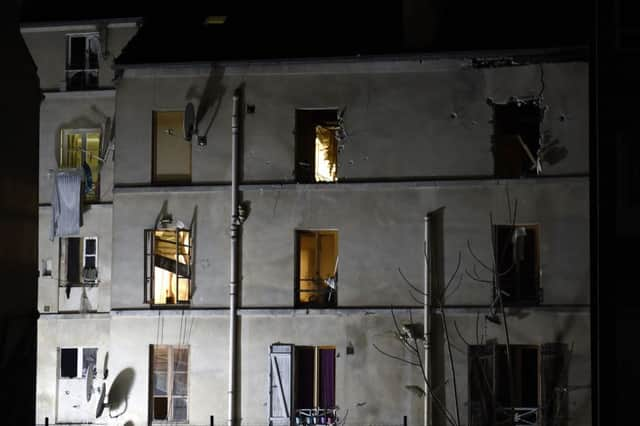Leaders: The worst kind of political posturing


The horrific attacks in Paris have simply reinforced the murderous and ruthless nature of the cult calling itself Islamic State and their single-minded aim to spread terror.
While the depravity of the terrorist group cannot be overstated, its ability to strike at the heart of the French capital underlines the job our police and security services have on their hands.
Advertisement
Hide AdAdvertisement
Hide AdYesterday’s police raids in the suburb of Saint Denis were the latest chapter in an unfolding horror which has gripped France since Friday night. The hunt for Abdelhamid Abaaoud – the apparent mastermind of last week’s attacks – led to a flat where a women wearing a suicide vest blew herself up and a suspect was killed in a hail of police bullets and grenades.
Five members of France’s anti-terrorism unit were injured in the incident and a police dog was killed.
The French police deserve a huge amount of praise for the courage they have shown, putting their lives at risk to strike back at those who brought terror to their capital on Friday night. That is reinforced by the suicide bomber they faced
But while they have approached their task with a stoic resolve, an unseemly debate has raged across the Channel about whether British police should be able to “shoot to kill”.
Earlier this week, Labour leader Jeremy Corbyn found himself fighting off attacks from his own MPs when he confessed to being “not happy” about the policy.
He has since backtracked, telling his party’s ruling executive committee that he supports any “strictly necessary force” to protect against a terrorist attack.
Prime Minister David Cameron has backed the police’s use of shoot-to-kill, as has the SNP’s deputy leader, Stewart Hosie, who yesterday said it was right that police be allowed to use “necessary force” against anyone posing a “real and immediate risk”.
After Friday’s attacks many of us were left with feelings of impotence and frustration for the plight of those innocent civilians gunned down with no chance of fighting back. But that frustration and desire to help must be felt tenfold by police officers and those others who spend their lives protecting the public.
Advertisement
Hide AdAdvertisement
Hide AdThe debate over shoot-to-kill is political posturing at its very worst.
It’s an attempt by politicians to take ownership of a situation where the grief of those who lost loved ones in Paris is still raw.
Their pronouncements on shoot-to-kill are designed to show us they are tough and willing to make the hard decisions.
But these are the sort of decisions which should be left to professionals who face tough calls in life-or-death situations and who know the realities of those situaions.
In the wake of the French attacks, our own security services confirmed that a number of plots had been foiled in the UK in recent months. The job our security services face is immense; from monitoring those returning from Syria to scouring electronic communications data from terrorist “chatter”.
The last thing they need now is for pontificating politicians to make their jobs harder.
A small step to gender pay equality
Figures from the Office for National Statistics show Scotland’s gender pay gap is narrowing, albeit slowly.
According to information published yesterday, men continue to earn around 7 per cent more than women in Scotland, despite the difference closing by 1.8 percentage points in the last year.
Advertisement
Hide AdAdvertisement
Hide AdWhile the gap remains large, Scotland compares favourably with the rest of the UK, where the overall figure is 9.4 per cent.
But other than the size of the gap, the figures tell us very little else.
They tell us neither why these wage disparities exist nor how they can be tackled.
They also disguise a situation where pay in some sectors is far further from being equal.
Research by the Law Society of Scotland earlier this year, for example, found male solicitors earn as much as 42 per cent more than their female counterparts.
Despite this, things are slowly but surely moving in the right direction.
The UK-wide pay gap is at a historic low and women in the their 20s and 30s are earning more than ever before.
According to the Scottish Government, female employment in Scotland is also at record levels, with Sweden the only country in Europe recording better figures.
Advertisement
Hide AdAdvertisement
Hide AdHowever, it’s still too difficult for many women to re-enter the workplace after having had children.
Female employees should be rewarded for having children, not financially penalised.
There is much work still to be done on addressing the issue and all employers have a role to play in that effort.
Yesterday’s figures show things are getting better for women in the workplace, but there is still a long way to go before parity is reached.